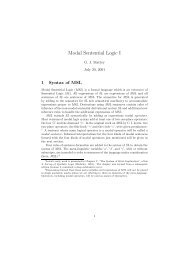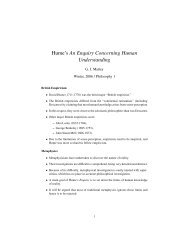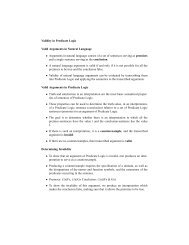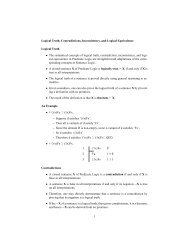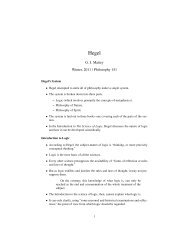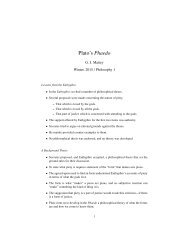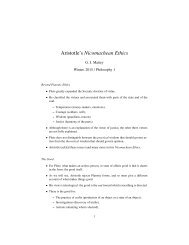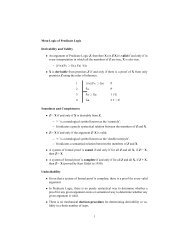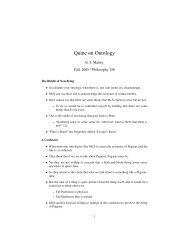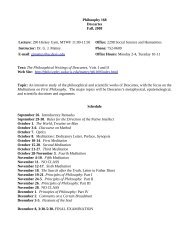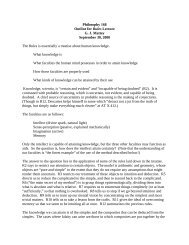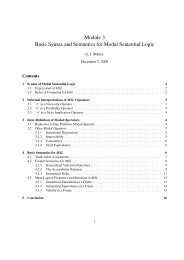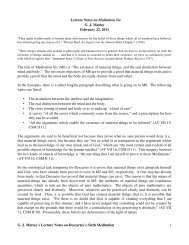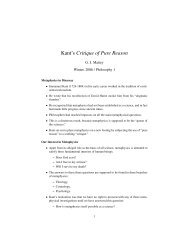Kant's Grounding for the Metaphysics of Morals - the UC Davis ...
Kant's Grounding for the Metaphysics of Morals - the UC Davis ...
Kant's Grounding for the Metaphysics of Morals - the UC Davis ...
Create successful ePaper yourself
Turn your PDF publications into a flip-book with our unique Google optimized e-Paper software.
Legislating Universal Law<br />
• The moral law, as given in <strong>the</strong> categorical imperative, is not imposed on us from<br />
without.<br />
• Instead, it is dictated by <strong>the</strong> rational will itself.<br />
• So, given <strong>the</strong> universal scope <strong>of</strong> <strong>the</strong> categorical imperative, <strong>the</strong> rational will dictates<br />
universal law.<br />
• This universal law is independent <strong>of</strong> any <strong>of</strong> our special interests.<br />
• Because <strong>of</strong> its universal legislating activity, <strong>the</strong> will is called its “autonomous”<br />
(where “nomos” = “law”).<br />
• A will which is subject to external laws is “heteronomous.”<br />
• Autonomy <strong>of</strong> <strong>the</strong> rational will is <strong>the</strong> only way to explain <strong>the</strong> a priori origin <strong>of</strong><br />
<strong>the</strong> moral law.<br />
The Kingdom <strong>of</strong> Ends<br />
• The concept <strong>of</strong> an autonomous rational will gives rise to “ano<strong>the</strong>r very fruitful<br />
concept,” that <strong>of</strong> a “kingdom <strong>of</strong> ends.”<br />
• Kant claims that it is possible that <strong>the</strong>re be a systematic union <strong>of</strong> rational beings<br />
under legislation that mandates treating each one as an end.<br />
• Morality can <strong>the</strong>n be understood in terms <strong>of</strong> a possible kingdom <strong>of</strong> ends:<br />
– A moral act is one that is based on legislation that makes a kingdom <strong>of</strong> ends<br />
possible.<br />
• Potential membership in a kingdom <strong>of</strong> ends constitutes human dignity, which is<br />
intrinsic worth.<br />
• Dignity is beyond all price, because what has a price can be replaced by something<br />
with an equivalent price.<br />
• All <strong>the</strong> o<strong>the</strong>r virtues (skill at work, wit, etc.) give us only delight, which has a<br />
price but not intrinsic worth.<br />
The Good Will<br />
• In Section One, Kant claimed that according to <strong>the</strong> common conception <strong>of</strong> morality,<br />
only a good will is good in itself.<br />
• He now connects <strong>the</strong> concept <strong>of</strong> a good with <strong>the</strong> categorical imperative, which is<br />
<strong>the</strong> highest principle <strong>of</strong> morality.<br />
8



